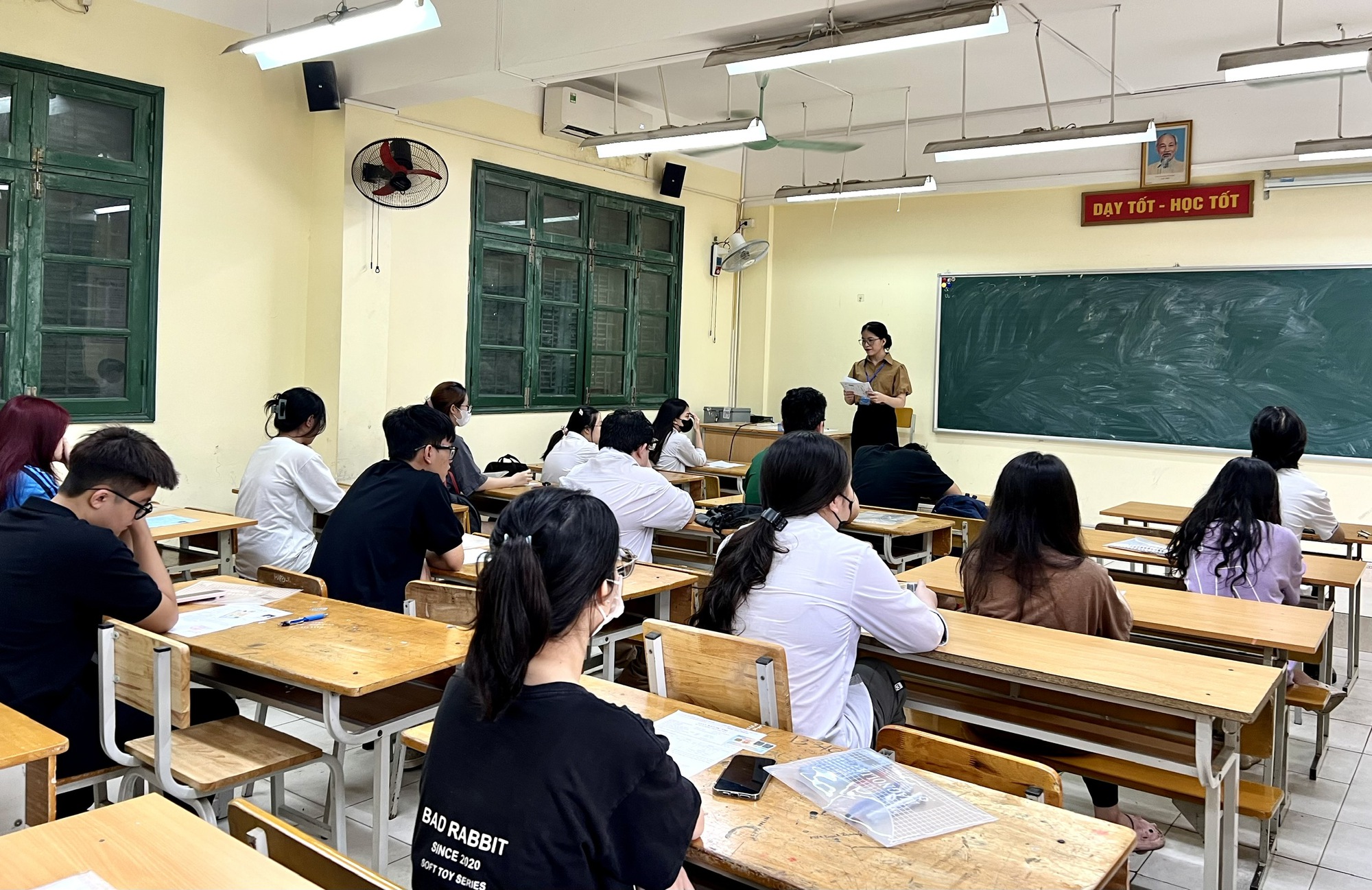Regulations on quality assessment and grading for units, civil servants, and public employees of the Ministry of Science and Technology in Vietnam
What are the regulations on quality assessment and grading for units, civil servants, and public employees of the Ministry of Science and Technology in Vietnam? – Cuong Manh (Ninh Thuan)

Regulations on quality assessment and grading for units, civil servants, and public employees of the Ministry of Science and Technology in Vietnam (Internet image)
Regarding this issue, LawNet would like to answer as follows:
On December 13, 2023, the Ministry of Science and Technology issued Decision 3012/QD-BKHCN Regulations on quality assessment and grading for units, civil servants, and public employees of the Ministry.
Regulations on quality assessment and grading for units, civil servants, and public employees of the Ministry of Science and Technology in Vietnam
Specifically, the evaluation and ranking of quality for units, civil servants, and public employees of the Ministry of Science and Technology must be based on the following principles:
(1) For units
- Ensure objectivity, comprehensiveness, fairness, accuracy, openness, democracy, seriousness, responsibility, and constructiveness; be disrespectful, repressive, and formalistic.
- Must be based on the level of task completion based on functions, regular tasks, and unexpected tasks; volume and quality of work completed; compliance with the internal rules and regulations of the unit, the Ministry, the Party's guidelines and policies, and the State's laws.
- Results of evaluating the unit's activities according to separate regulations issued by the Ministry of Science and Technology (if any) are used to consider, evaluate, and classify the quality of the unit.
- The results of evaluating and classifying the quality of units according to the provisions of this Regulation are used in evaluating and evaluating emulation - commendation and as a basis for evaluating and classifying the quality of party organizations.
(2) For civil servants and public employees
- The head of the unit directly evaluates and classifies the quality of deputies, civil servants, and public employees in the unit under his/her management and is responsible for his/her decisions.
Particularly for deputies of heads of public service units, the assessment and quality ranking are decided by the competent appointing authority.
- Ensure objectivity, fairness, and accuracy; no respect, oppression, favoritism, or formality; and ensure proper management and evaluation of civil servants and public employees.
- Quality assessment and grading must be based on assigned responsibilities, tasks, and results of task implementation, expressed through specific work and products; For civil servants and public employees, leadership and management must be linked to the results of performing tasks of the agency, organization, or unit assigned to manage and be in charge.
The rating level of a civil servant or public employee who is the head of a unit must not be higher than the rating level of the unit he or she heads, except in the case of a new leader moving in, which is unrelated to the rating level of the new unit.
Civil servants and public employees who have been appointed to a leadership position for less than 6 months by the time of assessment and classification shall conduct a review according to regulations and carry out assessment and classification according to position before being appointed; there is no evaluation or ranking according to the newly appointed position.
In cases where civil servants and public employees concurrently hold leadership or management positions, the unit where the civil servant or public employee holds concurrent positions is responsible for sending comments and assessments to the main work unit to serve as a basis for assessment and classification according to regulations.
- Civil servants and public employees whose working time during the year is less than 06 months are not subject to quality assessment and grading but must still review their working time during the year, except in the case of maternity leave.
Civil servants and public employees who take a leave of absence from work according to the provisions of the law during the year from 03 months to less than 06 months will still be evaluated, but they will not grade the quality at the level of good task completion or higher.
Civil servants and public employees taking maternity leave according to the provisions of the law, the quality rating results for the year are the quality rating results of the actual working time of that year.
Civil servants and public employees sent by their units for training and retraining at home and abroad are evaluated and ranked based on the level of task completion and learning results.
For civil servants and public employees who transfer jobs, the new unit is responsible for evaluating and grading the quality. If you have worked at the old unit for 6 months or more, it must be combined with the comments of the old unit, unless the old unit no longer exists.
For civil servants and public employees performing secondment tasks, the unit employing the seconded civil servant and public employee is responsible for evaluating and grading the quality. If, during the year of assessment, the working time at the managing unit is 03 months or more, comments from the managing unit must be summarized.
- The results of evaluating and classifying the quality of civil servants and public employees according to the provisions of this Regulation are used in evaluating and reviewing emulation - commendation and as a basis to collaborate in evaluating and grading the quality of party members.
(3) The quality of completed work by civil servants and public employees is evaluated based on the actual implementation of assigned work: Unit leaders are responsible for reviewing the organization and implementation of work assigned to civil servants and public employees as a basis for evaluating the quality of completed work.
(4) Basis for determining the workload of the unit, civil servants, and public employees: Work completed according to the registered annual work plan; work with output products is assigned on the Ministry's document management and executive direction system (there are jobs that are not assigned on the Document Management and Executive Direction System of the Ministry, units, and civil servants and public employees who need to make statistics of these jobs in the self-assessment report on annual work results); the number of unexpected tasks that arose during the year has been completed.
(5) Civil servants and public employees who are subject to party or administrative discipline shall be evaluated and ranked in quality as follows:
- Civil servants and public employees who are disciplined by the party or sign administrative laws in the year of evaluation will have their quality graded at the level of not completing their tasks, except for the case specified in Point b of this Clause.
- In cases where the violation has not yet had a handling decision signed by the competent authority but has been used as a basis for assessment and quality classification at the level of not completing the task in the year of assessment, disciplinary decisions issued after the year of assessment for that violation (if any) will not be counted to evaluate and classify the quality in the year of the disciplinary decision.
- In cases where civil servants and public employees are party members, they have been handled for signing the party law and signing the administrative law for the same violation, but party disciplinary decisions and administrative disciplinary decisions that do not take effect in the same year of assessment are only counted as the basis for a quality rating in one year of assessment.
(6) The proportion of civil servants and public employees classified as "Excellently completing tasks" does not exceed 20% of civil servants and public employees classified as "Completing tasks well." Each group of subjects has similar positions, roles, functions, and tasks.
The rate of civil servants and public employees "Excellent completion of tasks" is calculated separately for the group of civil servants, leadership and management employees, and the group of civil servants and professional employees.
In cases where the unit has excellent and outstanding achievements, completed assigned tasks ahead of schedule, completed unexpected tasks well, or proposed or organized innovation implementation to create positive changes and bring practical value and effectiveness, the competent authority shall decide the proportion of civil servants and public employees classified as "Excellent completion of tasks" in accordance with reality, ensuring the legitimate rights and interests of civil servants and public employees.
(Article 2 of Regulations promulgated together with Decision 3012/QD-BKHCN 2023)
More details of this regulation are in Decision 3012/QD-BKHCN, taking effect on December 13, 2023.
- Key word:
- quality assessment
- in Vietnam
- Number of deputy directors of departments in Vietnam in accordance with Decree 45/2025/ND-CP
- Cases ineligible for pardon in Vietnam in 2025
- Decree 50/2025 amending Decree 151/2017 on the management of public assets in Vietnam
- Circular 07/2025 amending Circular 02/2022 on the Law on Environmental Protection in Vietnam
- Adjustment to the organizational structure of the Ministry of Health of Vietnam: Certain agencies are no longer listed in the organizational structure
- Vietnam aims to welcome 22-23 million international tourists in Vietnam in 2025
-

- Procedures and cycle for quality assessment of ...
- 14:06, 25/02/2025
-

- Circular 04/2025 stipulating on the quality assessment ...
- 18:41, 20/02/2025
-

- Emergency response and search and rescue organizations ...
- 10:29, 11/09/2024
-

- Handling of the acceptance results of ministerial ...
- 09:30, 11/09/2024
-

- Guidance on unexploded ordnance investigation ...
- 18:30, 09/09/2024
-

- Notable new policies of Vietnam effective as of ...
- 16:26, 11/04/2025
-
.Medium.png)
- Notable documents of Vietnam in the previous week ...
- 16:21, 11/04/2025
-
.Medium.png)
- Notable documents of Vietnam in the previous week ...
- 16:11, 02/04/2025
-
.Medium.png)
- Notable new policies of Vietnam to be effective ...
- 16:04, 02/04/2025
-
.Medium.png)
- Notable new policies of Vietnam effective from ...
- 14:51, 21/03/2025
 (1).png)
 Article table of contents
Article table of contents
